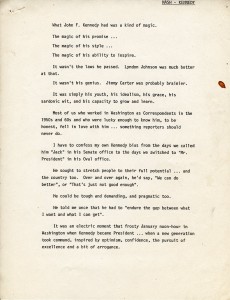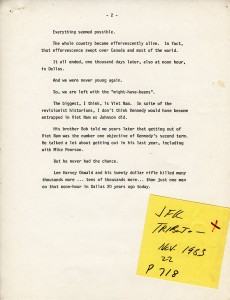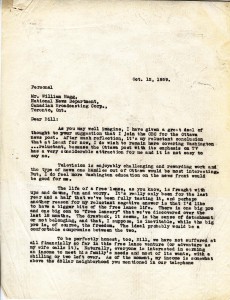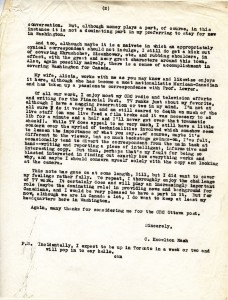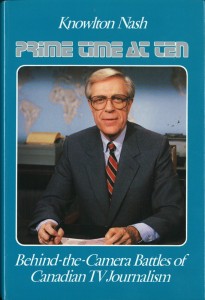 The Clara Thomas Archives & Special Collections are very pleased to announce that the papers of veteran journalist, broadcaster and pundit Knowlton Nash are now open and available to researchers.
The Clara Thomas Archives & Special Collections are very pleased to announce that the papers of veteran journalist, broadcaster and pundit Knowlton Nash are now open and available to researchers.
Knowlton Nash’s gift of his journalism records and related publications provides extensive and comprehensive documentation on the career of perhaps the most influential Canadian journalist during the second half of the twentieth century.
Born in Toronto on 18 November 1927, Cyril Knowlton Nash got started early in the news business, selling copies of the Toronto Star and the Toronto Telegram on a street corner as a boy. He studied journalism at the University of Toronto and began his career as a freelance reporter for The Globe and Mail, covering City Hall, the police beat, sports, labour disputes, and politics.
Nash joined the British United Press Service as a copy editor in 1947, and during the next three years, lived in Toronto, Halifax and Vancouver, eventually where he became a writer and bureau chief for the wire service. He traveled extensively throughout the country, covering a wide variety of stories that included politics, economics, local news, and sports.
In 1951,Nash became Director of Information for the International Federation of Agricultural Producers, a non-governmental organization that represented farm organizations in 40 countries at the United Nations. He was based in Washington, but his work took him to Paris, Rome, London, New York, Mexico City, and Nairobi.
Nash continued his involvement with print journalism by becoming Washington correspondent for the Financial Post in 1954, and also writing articles on American political and defense issues, and especially trade and commerce for the Windsor Star, Vancouver Sun, and Halifax Herald, as well as Maclean's and Chatelaine.
Tribute to John F. Kennedy by Knowlton Nash, November 1983.
Nash's expanded into broadcast journalism in 1956, when he began working as a freelance correspondent for the Canadian Broadcasting Corporation (CBC). He was appointed Washington Correspondent in 1961, and reported on assignments from almost every part of the world that included the war in Vietnam, various Middle East crises, civil war in the Dominican Republic, political upheaval in South America, and an interview with Che Guevara in the cane fields of Cuba. Nash gained prominence for his coverage of the administrations of Dwight Eisenhower, John Kennedy, and Lyndon Johnson, including the Bay of Pigs invasion of Cuba, the Cuban missile crisis, and Kennedy's assassination. Nash also interviewed many of the world's key political leaders during this period, including Presidents of the United States and the Prime Ministers of Canada and the United Kingdom.
A letter from Nash declining a position in the CBC news department in Ottawa, 1959.
Nash returned to Toronto in 1969 and was appointed Director of Information Programming at the Canadian Broadcasting Company (CBC). He was made Director of News and Current Affairs in June 1976, responsible for broadcast journalism at the national and local levels. Under his leadership, television journalism enjoyed increased resources, the national evening newscast was lengthened, and the CBC developed several series exploring the country's heritage, such as The National Dream and the broadcast memoirs of John Diefenbaker and Lester B. Pearson.
Nash left his executive position in 1978, when he succeeded Peter Kent as Chief Correspondent for the CBC's English Television News. This appointment gave Nash an opportunity to return to front-line journalism, reporting on Canadian, American and British elections, the Quebec Referendum, First Ministers' conferences, summit meetings, political conventions, royal and papal visits to Canada, and the wedding of Prince Charles and Lady Diana.
Nash's connection with the viewers turned The National into a ratings success. Nash served as Chief Correspondent until 1988, when he stepped down to prevent Peter Mansbridge from accepting a position in the United States. Nash remained with the network as senior correspondent, and anchored the weekly documentary series Witness, as well as the CBC educational series News in review from 1990 to 2004, long past his official retirement from the CBC on 28 November 1992.
Nash wrote nine books about his experiences as a journalist as well as several important articles on the CBC and issues in broadcast journalism for Canadian newspapers and magazines, as well as contributing a regular column for the Osprey Media Group.
Nash is a founding chairman of the Canadian Journalism Foundation, Chairman of Word on the Street (a Canadian organization devoted to promoting the reading of books), honorary chairman of the Toronto Arts Awards Foundation, and honorary chairman of the Canadian Organization for Development Through Education (CODE), a group devoted to fostering literacy throughout the developing world. He received the Order of Canada in 1988 and the Order of Ontario in 1998.
Researchers studying journalism, communication, and broadcasting in Canada, the development of the CBC, Canadian culture, arts and politics in particular and twentieth century history in North America in general will find the papers of Knowlton Nash to be a goldmine of information and insight.
A full finding aid to the materials can be found at: http://bit.ly/fRKmOR.

